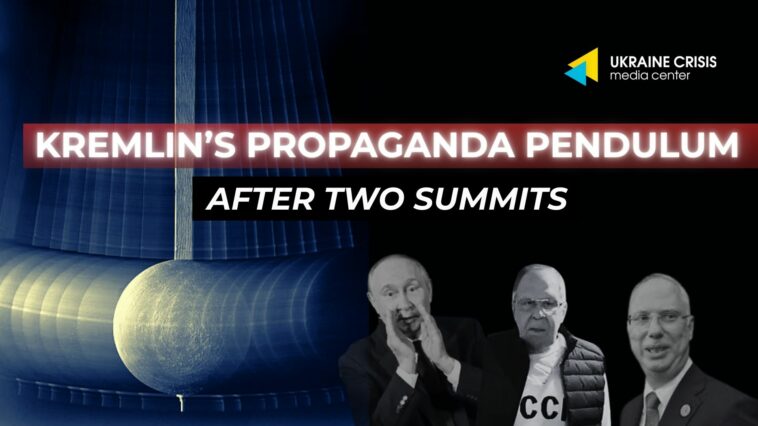The summit between Vladimir Putin and Donald Trump at Elmendorf-Richardson Air Force Base became the major topic of Russian propaganda. A few days before the meeting, the Kremlin’s information machine spread rumors about Ukrainian “provocations,” speculated about the goals of the talks, and created expectations that the American president would agree to Moscow’s terms.
A few days before the summit, telegram channels citing the Russian Ministry of Defense claimed that the Ukrainian Armed Forces were preparing a missile attack on a residential area in Kharkiv Oblast to «disrupt the peace talks in Alaska». According to the channels, the Ukrainians were supposed to shell the city «and present it in the media as a Russian strike». On the eve of the meeting, one of the telegram channels accused the «Kyiv junta» of launching drones in the Belgorod region and firing missiles at the city of Sumy in order to blame Russia and discredit the summit.

After the meeting between Trump and Putin, military correspondent Steshin said: «something important was agreed upon but not made public». According to the propagandist, in Anchorage, «the blame was shifted to the Ukrainians», and now Kyiv will «cry about its own suffering, driving itself even deeper into a corner». On the other hand, Kotz, a war «correspondent», was convinced that it was naive to expect «a quick solution to achieve peace”». In his view, Trump’s caution reflects an understanding that the war between Russia and Ukraine is «not Cambodia and Thailand and the Golan Heights», and that there will be no simple exchange of territory. Kotz suggested that Trump will try to implement the «Kissinger 2.0 plan» and freeze the front, but «Europe and Zelensky will not allow it». So, most likely, due to the unpredictable nature of Trump’s diplomacy, the Kremlin did not provide clear directives to its information troops on how to cover the results of the rendezvous between the two presidents.
Soon, the central narrative of Russian propaganda was to lower the degree of expectation that Kremlin ideologues had been fueling the day before. Russian media was flooded with reports and commentary stating the obvious: there was no breakthrough in the Putin-Trump talks. The general narrative boils down to the statement that «Ukraine will become a bargaining chip». Russian propagandists predict that future talks will take place without Kyiv’s participation, and that the United States and Russia will decide Ukraine’s fate behind closed doors.
The August 18 summit in Washington, D.C., where Volodymyr Zelenskyy and European leaders met with Trump, caused a significant change in the tone of Russian propaganda. State media began to describe European leaders even more disparagingly and focused on the fact that Ukraine would eventually be forced to make concessions.
Significantly, the main mouthpiece of the Kremlin’s international propaganda, RT, through the format of «expert» comments, openly admits that Moscow’s «gambit» is to get Washington out of the conflict, while Europe and Ukraine pursue opposite goals. For example, according to one RT expert, after Putin’s statements in Alaska, «the European delegation rushed to Washington» to put pressure on Trump to increase sanctions and continue supplying arms to Kyiv.

The main shift in rhetoric after the Washington summit was an increased focus on future concessions by Ukraine. Russian state media have started talking as if the peace process now depends on Zelenskyy agreeing to give up the territories occupied by Russia. RT emphasizes that the Ukrainian president has recognized for the first time that the territory issue is already on the table. TASS and RT noted that during his meeting with Trump, Zelenskyy «admitted that a potential exchange of territories was discussed» This admission was interpreted as a «dramatic change» in Kyiv’s position after years of principled unwillingness to cede an inch of territory. So now the Russian media are creating the information illusion that President Zelenskyy is «bargaining for land».
On the eve of the Trump-Putin summit, Russian media spread rumors of Ukrainian «provocations» and prepared the audience for a scenario in which the United States had to agree to Moscow’s terms. However, the course of the summit and the absence of a «deal» forced Kremlin propagandists to change their tone: from triumphant predictions, they switched to statements about «freezing the conflict» and shifting the blame to Ukraine.
At the same time, the Washington summit shifted the emphasis even further. While after Anchorage, the Kremlin media lowered expectations, after Zelenskyy and European leaders met with Trump at the White House, they began actively promoting the narrative of Kyiv’s inevitable concessions and Europe’s «unconstructive» role.
Mykyta Kuzmenko



